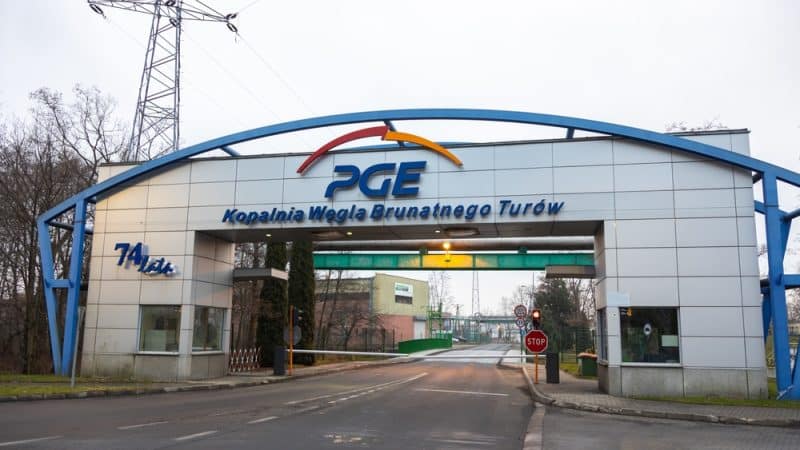Polish Prime Minister Mateusz Morawiecki vowed to resist attempts to close the Turow lignite mine, a subject of conflict between Poland and Czechia, despite a court order ruling the suspension of work.
In its ruling delivered last week, the Warsaw court suspended a decision to allow the coal mining concession at Turów to be extended because it could cause significant damage to the environment, as announced by the Frank Bold Foundation, Greenpeace and the EKO-UNIA Ecological Association in a joint statement.
But Prime Minister Mateusz Morawiecki remained defiant even in the face of the ruling, stating, “we will not let this mine close. We will do everything to make it function normally until 2040.”
“No courts, whether from Brussels or Warsaw, will dictate to us what is meant by Poland’s energy security, the security of families,” he said in Bogatynia, where the mine is located.
In September 2021, the EU Court of Justice imposed a daily fine of €500,000 on Poland for failing to implement its ruling concerning closing operations at the colliery.
Though it later withdrew its legal complaint, the Czech Republic, whose border is near the mine, filed its own suit, citing the harmful impact on the environment, particularly air and groundwaters in the Liberec Region.
In February 2022, an agreement was reached between Morawiecki and his Czech counterpart Petr Fiala, under which Poland paid the Czech Republic €45 million in compensation for the damage. Consequently, Czechia withdrew the lawsuit from the EU court.
In September 2022, the General Environmental Protection Authority (GDOS) extended the environmental permit for Turów, which faced criticism from environmental NGOs. Two months later, they filed a complaint against the Polish-Czech deal and the GDOS decision before the Regional Administrative Court in Warsaw.
The organisations, including the three that issued the joint statement on the court’s ruling, said the environment around the Turów lignite mine is still being affected.
Government backlash
“Once they tried to conquer Poland, and today see that it is enough to control the elites, that the elites somewhere in Warsaw serve foreign interests,” Morawiecki said, referring to the international character of the organisations that filed the complaint and comparing their actions to the partition of Poland by Prussia, Austria and Russia in the late 18th century.
The ruling Law and Justice (PiS) party often cites alleged foreign interference as threatening Poland’s independence. It refers to the opposition as the self-proclaimed elites that PiS deprived of influence when it came to power in 2015.
The government “will not agree to an illegal decision” by the court concerning suspending the mine’s operation, the prime minister wrote on Facebook.
“We cannot implement it, and we will do everything for it to be repealed,” he added.
According to Morawiecki, the adjacent Turów power plant produces 8% of Poland’s energy, while the court’s verdict means suspending the permit that allows Turów to mine lignite after 2026.
The ruling is unenforceable because it cannot be implemented without jeopardising Poland’s energy security, Polish EU Minister Szymon Szynkowski vel Sęk told state broadcaster TVP Info, adding that implementing the judgement would “cause extraordinary social and economic harm.”
The Turów complex helps ensure energy security for Poland and the region for the coming years, tweeted Climate Minister Anna Moskwa. The Polish government will not allow mining to be stopped and thousands of jobs to be lost for the region’s people, she insisted.
Prague welcomes the ruling
“The decision of the Polish court shows that the lawsuits against mining in Turów have a justified basis and do not stand on water,” commented Petra Kalenská, the lawyer at Frank Bold, who is dealing with the Turów case.
According to her, the report submitted by the Polish miner, PGE, suffers from serious flaws. Among other things, it does not consider the impact on Czech groundwater or the landslides in Zittau.
“It is essential that the mining impact report describes the true extent of the damage caused by mining and includes measures to prevent such damage. Without this, mining cannot continue,” Kalenská said.
MEP Mikuláš Peksa from the Czech Pirate Party, which belongs to the ruling coalition in Czechia, believes the verdict is even more worth noting, given the doubts over the judicial independence in Poland.
“I was delighted that despite the tragic state of the PiS-glossed Polish judiciary, the Warsaw judge dared to say something so contrary to the interests of the state-owned PGE and, on the contrary, effectively confirming the complaints of the Czech citizens who live in the Turów area,” he tweeted.
“It is only a pity that the government too often gives in to PiS’ demands without resistance.”



